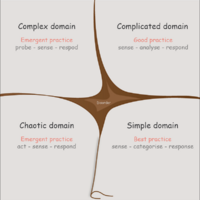The Cynefin Framework
From apppm
(Difference between revisions)
LasseMadsen (Talk | contribs) |
LasseMadsen (Talk | contribs) |
||
| Line 11: | Line 11: | ||
==The Cynefin model== | ==The Cynefin model== | ||
*Simple contexts (known knowns) | *Simple contexts (known knowns) | ||
| + | **Nature | ||
| + | Familiar, certain | ||
| + | Constraints are understandable to all | ||
| + | Understandable solutions | ||
| + | |||
*Complicated contexts (known unknowns) | *Complicated contexts (known unknowns) | ||
*Complex contexts (unknown unknowns) | *Complex contexts (unknown unknowns) | ||
Revision as of 16:35, 16 November 2014
This article will introduce the Cynefin framework and its underlying practices, which can be used for sense- and decision making in a complex and complicated world. [1] The framework is developed by David J. Snowden (born 1 April 1954), and is used by leaders to determine operative context so they can make appropriate choices.
The Cynefin framework splits the issues that faces leaders into five contexts; simple, complicated, complex, chaotic and disorder. Each of which requires different approaches to leadership style.
Contents |
History
The Cynefin model
- Simple contexts (known knowns)
- Nature
Familiar, certain Constraints are understandable to all Understandable solutions
- Complicated contexts (known unknowns)
- Complex contexts (unknown unknowns)
- Chaotic contexts (unknowable unknowns)
- Disorder (not determined)
Examples of contexts
- Examples of simple contexts
- Examples of complicated contexts
- Examples of Complex contexts
- Examples of Chaotic contexts
- Examples of Disorder
Examples of uses
- Cynefin used in Ergonomics
Criticism
- Critical reviews of the Cynefin Framework
- Risk of oversimplifying the problems
Additional reading
- Harvard business review: Snowden, David J., and Mary E. Boone. "A leader's framework for decision making." [1]
- Cynefin 101, an article by Greg Brougham http://www.infoq.com/articles/cynefin-introduction
- The new dynamics of strategy: sense-making in a complex and complicated world http://alumni.media.mit.edu/~brooks/storybiz/kurtz.pdf
- Video: (Youtube): The Cynefin Framework http://www.youtube.com/watch?v=N7oz366X0-8
- Article archive: cognitive-edge.com http://cognitive-edge.com/library/more/articles/
- Article: 'Cynefin Centre: Life after IBM' 2005, KM World, 14, 7, pp. 1-26, Business Source Premier, EBSCOhost, viewed 14 November 2014.
- Article: Elford, W. (2012). A multi-ontology view of ergonomics: applying the Cynefin Framework to improve theory and practice. Work, 41, 812.
